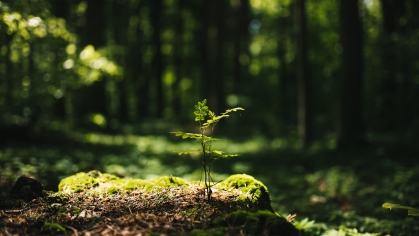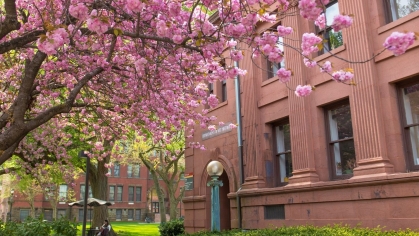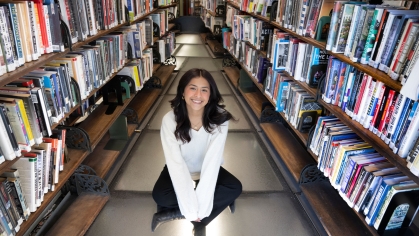We recently had the opportunity to speak with Associate Professor of Teaching, Director of the Baccalaureate Social Work (BASW) Program, and Campus Coordinator of the Baccalaureate Child Welfare Education Program (BCWEP) Dr. DuWayne Battle about the mission and evolution of the three-credit Diversity and Oppression course that all Rutgers School of Social Work BASW and MSW students are required to take. He encourages students to use this course to “take a good look and gain new insights.”
Q: Could you share a bit about the Diversity and Oppression course?
A: Yes, I am happy to share. The Diversity and Oppression, also called D&O, is one of the most exciting and challenging courses for faculty and students alike. It is a three-credit course that is a requirement for our undergraduate (BASW) and graduate (MSW) students to complete. It is designed to be experiential, so I encourage students to focus more on their experiences rather than just the content being covered in class. Our goal is to help students focus on a range of diverse populations and analyze the effects of oppression through a social justice lens.
Q: What are some of the activities and projects you assign to students?
A: I am so glad you asked this question. All of the assignments in the class are designed to build on each other and to expand the students’ view and sharpen their focus on these important topics. I want students to take a good look and gain new insights that will help them in their social justice work. One of our first assignments is to get students to look back and reflect on the hidden history revealed in the PBS documentary that is based on the book, Slavery by another name: The re-enslavement of Black Americans from the Civil War to World War II.
The next main assignment is to get students to look within, as they focus on their personal background. Students are asked to interview an older family member or someone who is able to help them explore their family’s racial, ethnic, and cultural background. Something I’ve observed is that many people are unable to understand and appreciate their ethnic and cultural heritage because they try to assimilate into what they think it means to be American. Seeing the self-discoveries students make through this assignment is eye-opening. It helps students identify where they are located on the continuum between privilege and oppression and the factors that shape their worldview.
Another project we ask students to complete is called the interview literature review paper. Here students are encouraged to look at someone who is different from the way the student identifies in terms of race, gender, sexual orientation, religion, etc. When I say “look at” someone, I mean this in the most positive way possible. I want students to really see the other person. The student is expected to demonstrate cultural humility as they learn from their interviewee. They are also asked to do a brief literature review of scholarly articles and analyze how the research resonates or differs from the interviewee’s experience, as well as identifying implications for social work practice.
The final task students participate in at the end of the class is a social justice activity and reflection paper. Here students are challenged to look beyond injustice to see their potential to eliminate oppression. They participate in a social, environmental, economic, or racial justice action. In this way, students apply their knowledge, values, and skills as they move through the stages of Liberatory Consciousness: awareness, analysis, accountability, and action/allyship (Love, 2000).
Q: Being an experiential class, how has the course's delivery changed due to the COVID-19 pandemic?
A: This is a really great question. I was teaching this class when everything shifted to social distancing. Although we have been teaching this class online for a number of years, the assignments still had in-person aspects to them. Referring back to the interview literature review paper, for instance, in pre-COVID times, we would ask students to meet with the other person in a social environment so students could be immersed in new atmospheres where they would be in the minority – ones that would push them out of their comfort zones. For example, if a Christian student were to interview a Jewish person, they would go to the synagogue with them to experience a new place of worship, share a family meal, or participate in a holiday or some other cultural experience. If a cisgender, heterosexual student was to speak with someone of another sexual orientation, they may go to a gay bar and experience what it's like to be in that space. This exercise, unfortunately, had to be altered because of the pandemic. Although a few students were able to participate in a virtual event, most students dropped this component of the assignment. In all cases, students were advised to practice CDC guidelines and keep themselves and others safe.
On the other hand, the pandemic has helped uncover more inequities in our society. We can learn from these disparities and emphasize the difference social workers can make. We ask students to think about disproportionate vaccine, infection, hospitalization, and mortality rates. Students can also think about who had access to the necessary resources to combat issues stemming from times when we were on lockdown.
Relatedly, during the pandemic we witnessed protests across the nation and around the world calling for an end to the deaths of unarmed Black men and women at the hands of police. We now have the opportunity to emphasize the calls for racial justice in the D&O course (AASWSW, 2021; CSWE, 2021; NASW, 2007, 2021).
I also want to acknowledge the fact that a lot of work has been done to revise and improve the D&O course over the years that I have been a course coordinator and especially during the last several months. Therefore, I want to extend thanks to the D&O core teaching faculty who worked hard, even with everything going on during the pandemic, to make significant revisions to this course.
Q: Why do you think it is important for students to take this course?
A: I am glad you asked this question. This course helps students develop and demonstrate the skills to “engage diversity and difference in practice.” This relates to one of the required Council on Social Work Education competencies. It opens students up to the experiences they will have as social workers and social justice advocates. It is crucial that students remain aware of diversity and difference as they work to challenge disparities. They must identify their own biases and practice cultural humility in order to exist with and serve others who are different from them. By making this course experiential, students are able to take a good look and gain new insights to apply the knowledge, values, and skills they acquire at micro and macro levels of practice.
References:
American Academy of Social Work and Social Welfare. (2021). The Grand Challenges for social work to eliminate racism. https://grandchallengesforsocialwork.org/eliminate-racism/
CSWE. (2021). 2022 Educational Policy and Accreditation Standards. https://www.cswe.org/getattachment/Accreditation/Information/2022-EPAS/EPAS-2022-Draft-1-April-2021-(2).pdf.aspx
Love, B. J. (2000). Developing a liberatory consciousness. In Adams, M Readings for diversity & social justice, pp.470-474. Routledge.
NASW. (2007). Institutional racism & the social work profession. A call to action. https://www.socialworkers.org/LinkClick.aspx?fileticket=SWK1aR53FAk%3D&portalid=0#:~:text=The%20policy%20specifically%20calls%20upon,work%20(NASW%2C%202006).
NASW. (2021). 2021 Revisions to NASW Code of Ethics take effect. https://www.naswil.org/post/2021-revisions-to-nasw-code-of-ethics-take-effect



